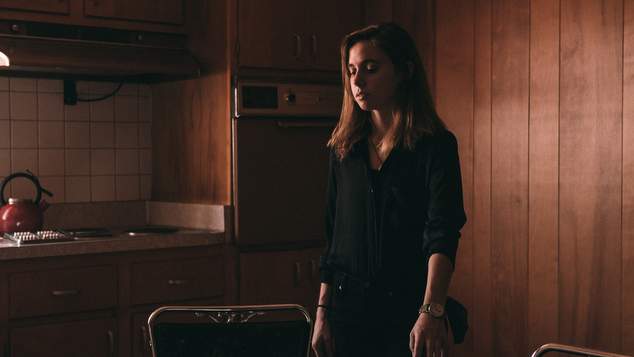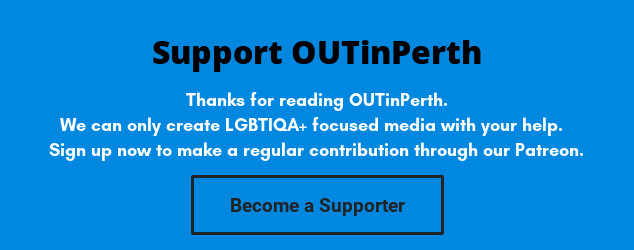
Julien Baker has released two highly acclaimed albums of her songs, and recently teamed up with fellow musicians Lucy Dacus and Phoebe Bridgers to form boygenius. Baker chatted to OUTinPerth about making music, growing up in Memphis, and maintaining her Christian beliefs
Many of the descriptions of your music list it as folk music, but how would you label your musical output?
I’m actually not sure, usually I say it’s in the realm of “singer-songwriter” though that’s a somewhat nebulous term. Sometimes I say “I don’t know, it’s mostly just me and an electric guitar”, which used to be true, but as I play with a violinist and piano now that’s also not accurate. Sometimes I just skirt around the question long enough to evade it and allow people to decide their own nomenclature.
To people on the other side of the planet, the words “Memphis, Tennessee” immediately make us think of music, Elvis, Paul Simon singing Graceland, a Mecca of music. What’s it like when you grow up there?
Well, I’ve never been to Graceland– sacrilege, I know. But like most areas with tourist attractions, I think the things that seem intrinsically “Memphis” to visitors are not the same as what’s intrinsically Memphian to me.
When I think of Memphis, I tend to think of bands like Lucero and Pezz, I think of the coffeeshops, basements, and dive bars there where kids would come in from the suburbs to have shows. I think of the Memphis College of Art, the art college that, sadly, announced recently it would be closing soon.
To me, Memphis is a very interesting place because it is quite insular; I think that because of the comparative resource scarcity in Memphis as compared with a city like New York or Nashville that has a larger arts scene, Memphis developed a different protocol around local creative endeavors.
I think there’s a resilience bred into people who are a part of the community in Memphis, an interdependency out of necessity. People with differing visions and ideas I think tend to orbit each other, because the community is smaller and so statistically your paths overlap more, and I think learning to cooperate with people from various scenes brings about a really amazing confluence of ideas.
So growing up there really instilled a belief in me that artistic expression is something that is necessarily dependent upon interpersonal relationships, something that can only be realized within community and which in turn should serve that community.
Audiences are loving your boygenius collaboration with Phoebe Bridgers and Lucy Dacus, what attracted you to this collaboration? Is it once off project or will there be more in the future?
I had been friends with Lucy and Phoebe individually for a long time– and when we booked the tour that was originally just the three of us performing individually I think we all felt like it would be something very special if we were able to collaborate, and as we began brainstorming what the nature of that collaboration would be, it sort of snowballed into us recording a full EP.
I definitely think we will do more– both Phoebe and Lucy are pretty busy touring and creating for their individual pursuits but I know we all want to rejoin again at some point in the (hopefully near) future.
What books, films, music, etc are you consuming at the moment?
I haven’t seen too many movies lately– I just never think to go, but recently I saw If Beale St. Could Talk, a retelling of a James Baldwin novel directed by the director who did Moonlight, which I also loved. I’ve been reading heaps of good books, I just read a book called Heartberries by Terese Marie Mailhot, a beautiful and poetic memoir, and I read Ursula K. LeGuin’s Left Hand of Darkness, which is this amazing social commentary told in the form of an epic sci-fi novel; I highly recommend both.
How was making Turn Out The Lights different to creating your first record Sprained Ankle?
I think that Turn Out The Lights felt different in that I knew there would be an audience, at least to some degree. After touring Sprained Ankle I had changed a lot of how I thought about the writing process.
After having written these songs that were extremely, maybe myopically, focused on my individual pain and experience and then singing them in front of audiences in far-flung places I think it gave me a lot of perspective, and made me want to consider how to bridge the gap between writing from individual experience and making that relevant to the human experience, or the experience of people I might be singing to.
I think I became more conscientious of where I am situated in the world and how I interact with the stories of others.
Are all the songs you write destined for public consumption, or are there private songs you write just for yourself?
I think at first, they are all for myself. They kind of have to be– I think if I begin creating something that I conceptualize as being for public consumption, it will come off artificial. It’s after I’ve created a song, when I’ve expelled the emotion I need to in the moment, that I can come back to it and edit it, take the loose idea and try to identify a theme and refine it.
Many LGBTIQ+ people of faith struggle to reconcile their sexuality and the religious beliefs they’re brought up with, what has been your journey?
I struggled a lot with my faith and queerness as a child– I was socially conditioned to think that these two integral parts of my being were not only mutually exclusive, they were at odds with each other, and so I felt like there was an ultimatum between the two. And I think that was more of a product of my socialization through media, through seeing Fox News and hearing the church doctrine promoted by the Evangelical right. However, and I am very aware how privileged I am in this, my parents were incredibly, surprisingly accepting and encouraging.
When I came out to my father I told him I thought I was going to hell, and he spent hours and hours combing through books and text and convincing me that there was nothing wrong with me, that I existed in exactly in the way I was supposed to be. I’ve since been a part of many faith communities and had a variety of experiences, some welcoming and some extremely not welcoming.
I think when I was younger, I spoke with a much more cavalier tone about my upbringing in church, about the way that I had been exposed to a faith community that proved to me that faith and queerness were not mutually exclusive. And i still do believe that the rejection of LGBTIQ+ people by the church is an instance of faith being decontextualized and weaponized as a means for the ruling dominant demographic to preserve and consolidate power, it is a social and political tactic that is quite removed from the understanding I have of gospel principles.
However, I now am a bit more cautious with the language that I use around discussing my journey of faith because I know that, while my journey has implications for what is possible as another more accepting model of religion, it is not many people’s experience. Many of my LGBTIQ+ friends have experienced heinous treatment within their faith communities, and I think that their hurt is something that should be honored.
I can present this alternative to the prevailing narrative and exist as an example, but I cannot ask people to dismiss the very real pain that they have felt because of the church and without holding mainline religion accountable for those things I don’t think there can be real healing or progress.
So, while I still strive to be open about my faith I think I try to consistently remind myself of the privilege I have had in my (mostly) positive experience and give myself enough perspective to be more mindful of others and where they might stand with their faith or non-faith.
What drives you crazy?
Well, plenty of things– as a united states citizen there’s something pretty much weekly that drives me crazy, but they are things that should and do drive many people crazy, the detainment of children at the border, the criminalization of the poor, erasure of trans people by the US government, for example.
There are few things I have that get under my skin that aren’t obvious like that, as in I am usually hard pressed to think of a particular pet peeve, I try not to let myself get bothered by things that are inconsequential or not worth it.
Maybe when people don’t stack their tray at airport security. And when someone is rude or unkind to people working in the food service industry. If you yell at a barista I just don’t trust you.
Update 13:00 11-02-19 Unfortunately this show has been cancelled. Head to perthfestival.com.au to see the other artists appearing.
Graeme Watson, Image: Nolan Knight




